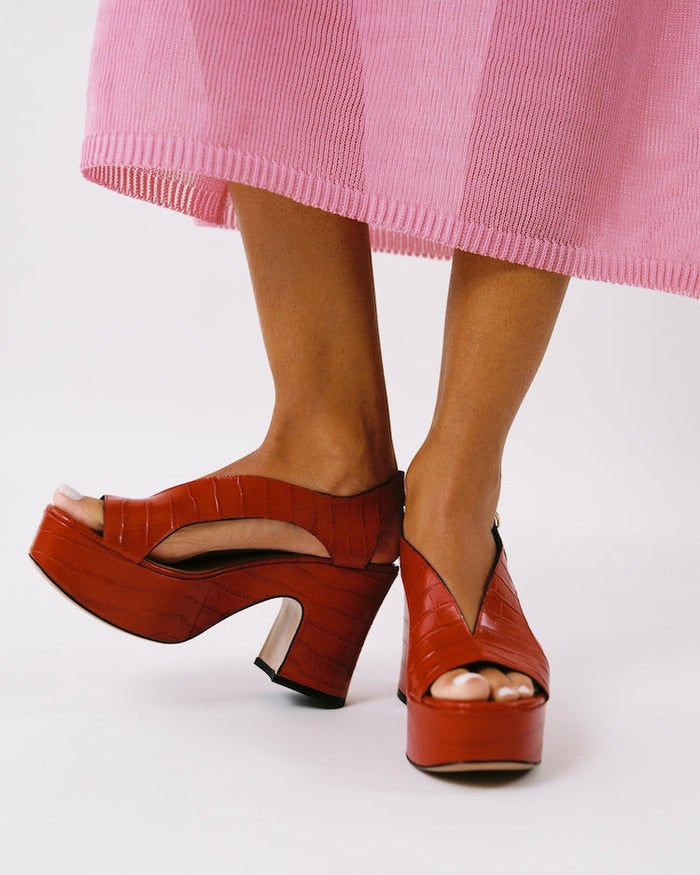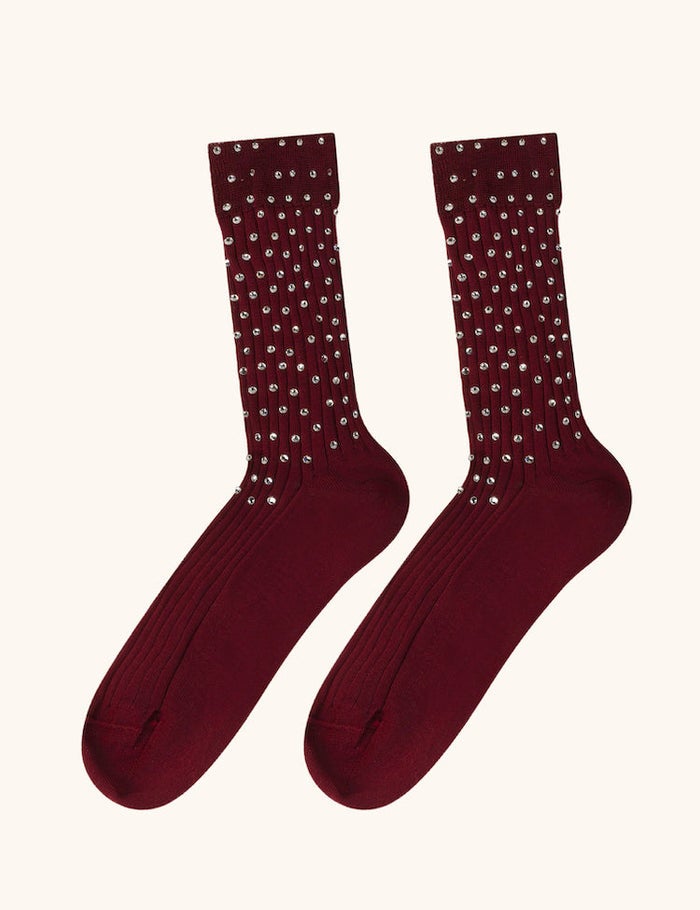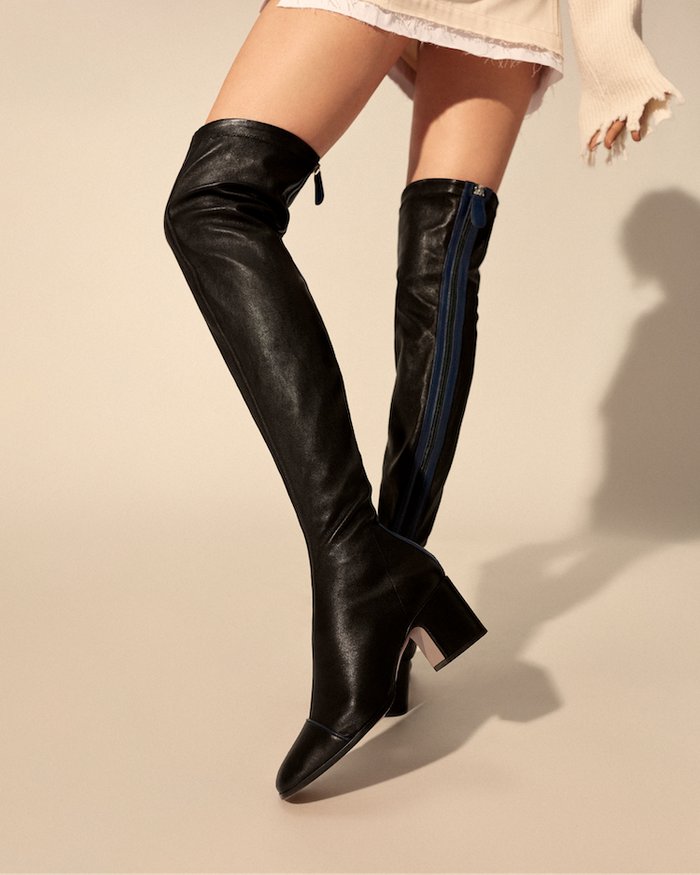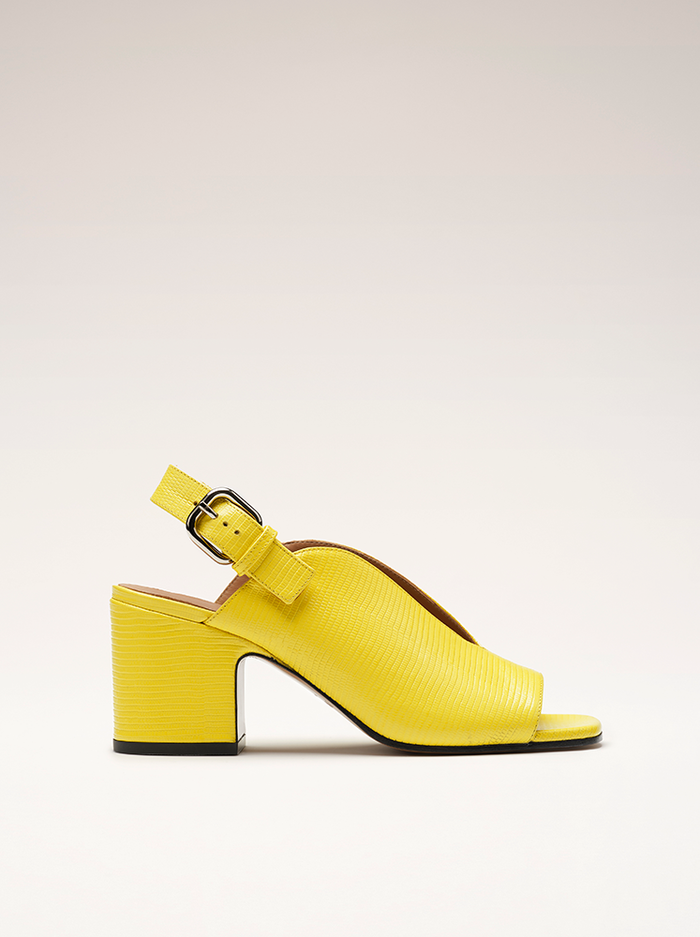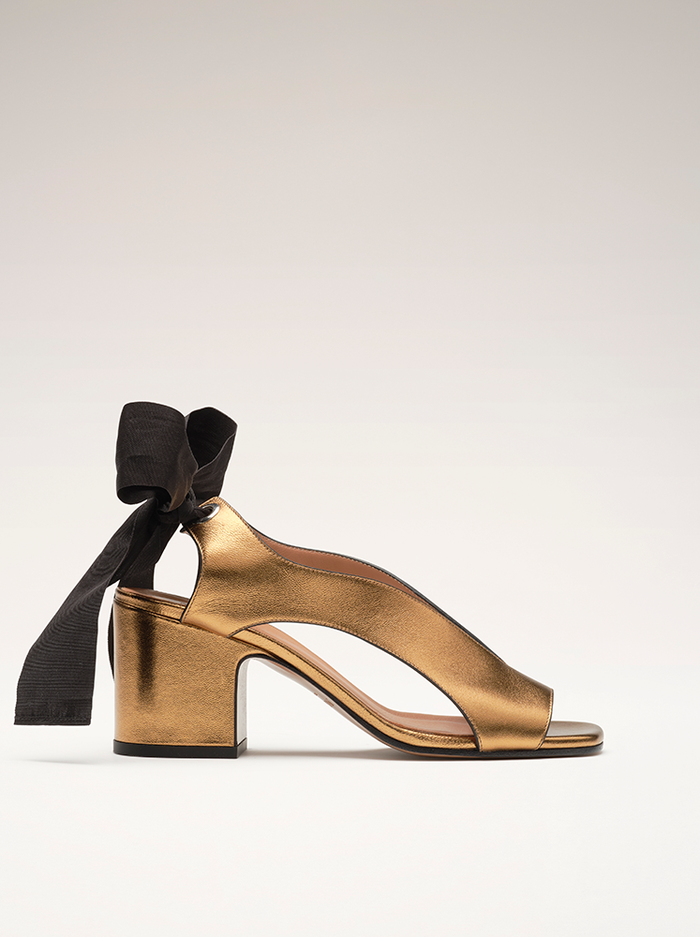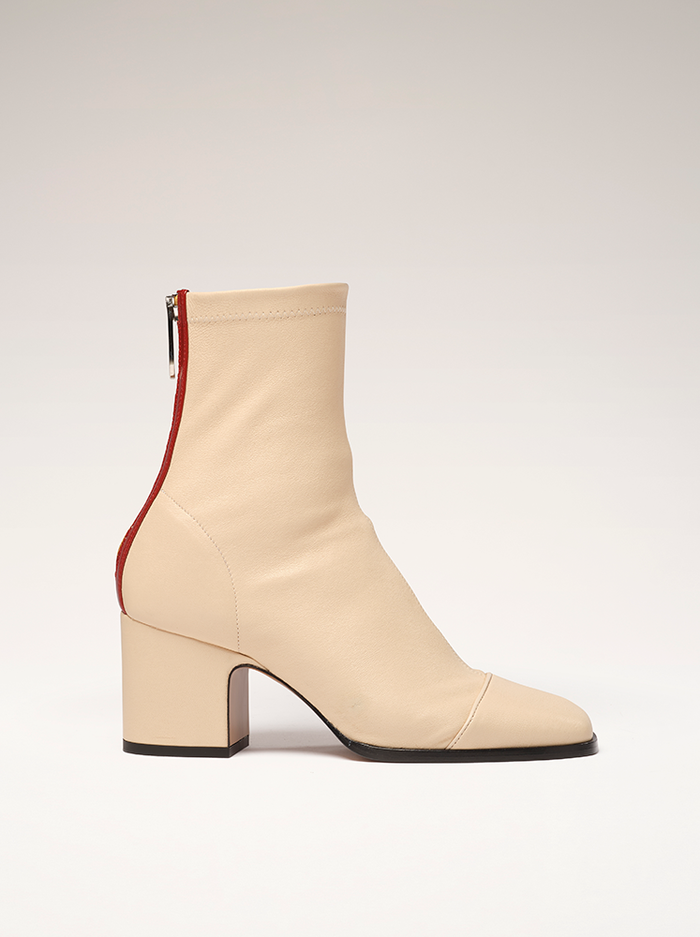All linked products are independently selected by our editors. If you purchase any of these products, we may earn a commission.
In the summer of 2023, just a few years after the launch of Parisian footwear label Nomasei, founders Paule Tenaillon and Marine Braquet received a message on Instagram. It was from Blake Lively who, after stumbling upon their account, wanted to know where to get her hands on a pair of their Nono loafers. While Lively might’ve been the first A-lister to slide into their DMs, she certainly wasn’t the first celebrity to show interest. Tenaillon recalls a period in late 2022 when their designs were spotted, back to back, on Nicole Kidman, Kristen Stewart, and Emily in Paris’ Camille Razat. Despite the growing list of celebrity clientele, which also includes Katie Holmes, Tracee Ellis Ross, and Bella Hadid, Braquet feels that “we still haven't made it.” She continues, “I think we will start to feel safe when our name will be a little bit more known and [we] continue to have this trust in ourselves.”
AdvertisementADVERTISEMENT
Part of Nomasei’s appeal is that it has good design in its DNA: Tenaillon’s background includes designing for Jimmy Choo, Jil Sander, and Givenchy, while Braquet’s experience in product development has been shaped by her work with Dior and Louis Vuitton. By the time the two met at Chloé in 2016 though, they’d grown disillusioned by the fashion industry’s punishing production schedules and excessive waste. “We were producing so many shoes and in the end, so many of them won’t be worn,” Braquet explains.
The fashion industry's oversupply problem is as pervasive as it is murky, with the majority of brands choosing neither to disclose their annual production volumes nor to commit to reducing the number of new pieces being made, according to Fashion Revolution. The available statistics suggest that as many as 45 billion of the 150 billion fashion items produced each year are never sold or worn, often ending up in landfills or being incinerated.
In addition to this waste, Braquet got tired of making styles that were designed with trends rather than longevity in mind — shoes that “were not made with a good sense of practicality, of design, because we never had enough time [to design them].”
In late 2017, she approached Tenaillon about starting a footwear company grounded in a slower business model. “[I thought] maybe if we calm down and we take the time to think a little bit, then maybe we will make less mistakes, maybe we will produce a little bit less, maybe we will waste a little bit [less].” Now, they only design and produce styles for Nomasei that they believe in. “You realise that maybe there’s another way to do stuff which makes more sense,” says Tenaillon.
AdvertisementADVERTISEMENT
One example is the popular Taxi sandal, a platform shoe padded with memory foam for all-night dancing and available in a range of colours. The embossed red leather iteration was recently reintroduced, with 20 percent of the $499 retail price going to the (RED) Global Fund to support healthcare programs for women and girls in need. Another is the ultra-stretchy Whisper boot, an over-the-knee style chosen by Kelly Rutherford during a January visit to the showroom. In addition to boasting a sleek design, it is also suitable for wide calves thanks to its remarkably elastic French lambskin leather.
Nomasei’s aim to serve as a responsible alternative to luxury offerings means their prices range from $150 to $800. Working closely with manufacturers (more on that below), Tenaillon and Braquet maintain controlled margins and ensure the use of thoughtful materials such as solvent-free glue and lead-free crystals. The name of the brand itself is an homage to everyone who comes into contact with it: Nomasei is the Italian slang for “six hands,” evoking the collective input of every individual involved in the making and promotion of each shoe.
The duo also takes pride in creating long-lasting designs. In addition to using high-quality materials, to encourage shoppers to keep Nomasei products outside the landfills for as long as possible, the brand offers maintenance products and a forthcoming repair kit for their shoes; those based in Europe also have access to a cobbler service that has partnered with the brand. “Sometimes the most sustainable thing is to have a product that people will actually wear and keep because when you like something and you feel good in something, you want to take care of it,” says Braquet.
AdvertisementADVERTISEMENT
When R29 sits down with the founders in their Paris showroom, the ways they complement one another are evident. Tenaillon is detail-obsessed and contemplative. Braquet is well-versed in the business side of things and doesn’t hesitate to put everything on the table, like how it took Nomasei (which launched right before the pandemic hit) until the fall of 2021 to see a significant boost in sales and brand awareness. “It’s why we keep going further and further,” Tenaillon adds. “When you are insecure you need to prove yourself.”
Ahead, we chat with the pair further.
What keeps you motivated?
Marine Braquet: [When] we are in contact with the customer and they love the brand. When they come here to the showroom [and] you hear them speaking like, “I saw your post on Instagram, it was saved in my phone for two years and I wanted to come when I was in Paris.” When you hear that you’re like, “Okay, there is something that we’re doing right.”
Marine Braquet: [When] we are in contact with the customer and they love the brand. When they come here to the showroom [and] you hear them speaking like, “I saw your post on Instagram, it was saved in my phone for two years and I wanted to come when I was in Paris.” When you hear that you’re like, “Okay, there is something that we’re doing right.”
What do you think you’re getting right that big brands aren’t?
Paule Tenaillon: We want to be close to our clients, it’s why our margins [are low], it’s why the shoes are comfortable, it’s why everything is studied to be worn and bought by women like us. And we don’t idealise ourselves.
Paule Tenaillon: We want to be close to our clients, it’s why our margins [are low], it’s why the shoes are comfortable, it’s why everything is studied to be worn and bought by women like us. And we don’t idealise ourselves.
MB: The customers are the best assets ever. I think one of the things we did right with Nomasei is that we created the showroom. Women come and they talk. And they give you feedback on your product, and it’s so interesting.
AdvertisementADVERTISEMENT
PT: It’s a sisterhood that is created naturally between the clients and it’s super fun. They talk together about these shoes but then they talk about their lives and it becomes, sometimes, very intimate, and it’s very interesting to know about other women’s lives — the way they buy, why they buy.
I love that everything at Nomasei — from the cutting of the leather to the assembling of the shoe — is done within a 55 km distance of it.
PT: The main factory we use is in Tuscany between Florence and Pisa. [It’s] all eco-conceived, so there is a cathedral roof to direct the air, it’s all made to cool the air naturally and to grab rainwater for the cooling system. There are a lot of windows so the workers have light. It’s all made to make the conditions better for the workers and to use less electricity and energy. There is solar electricity so 40 percent of their energy is independent, made by themselves.
PT: The main factory we use is in Tuscany between Florence and Pisa. [It’s] all eco-conceived, so there is a cathedral roof to direct the air, it’s all made to cool the air naturally and to grab rainwater for the cooling system. There are a lot of windows so the workers have light. It’s all made to make the conditions better for the workers and to use less electricity and energy. There is solar electricity so 40 percent of their energy is independent, made by themselves.
Katie Holmes, Kristen Stewart, Blake Lively, and the Hadid sisters are some of the celebrities who have worn your pieces. How does it feel to see your shoes getting this kind of attention so early on?
MB: With Katie Holmes, for example, it’s so cool because she wore the shoes one time in January last year and then she was photographed again in the streets one year later wearing them... And this, for us, is the best because Nomasei is supposed to be like, “I’m wearing this shoe today because I want to feel good.”
MB: With Katie Holmes, for example, it’s so cool because she wore the shoes one time in January last year and then she was photographed again in the streets one year later wearing them... And this, for us, is the best because Nomasei is supposed to be like, “I’m wearing this shoe today because I want to feel good.”
AdvertisementADVERTISEMENT
PT: What we want is to be in the daily life of all women because the shoes are made to help them to live better.
The Nono loafer in particular has been a popular style among celebrities and other clients. Why do you think that is?
MB: It’s an alternative to sneakers for me and I think that’s why it picked up after COVID-19 because people wanted to dress up again but still be in flats for comfort. I think it’s also because there is a strong personality with this style. And I believe, because I’m a little bit superstitious, that it brings good luck.
MB: It’s an alternative to sneakers for me and I think that’s why it picked up after COVID-19 because people wanted to dress up again but still be in flats for comfort. I think it’s also because there is a strong personality with this style. And I believe, because I’m a little bit superstitious, that it brings good luck.
PT: The hand on it is like a talisman.
Could it have something to do with the appeal of French Girl style? Or is that just a tired stereotype at this point?
MB: I think you are always fascinated with the things that are not part of your daily life. For example, I am fascinated with the Americans and the way they have a glow, their hair is always perfect… Because being French is always to be a little bit messy. And me, I’m not Parisian, I come from the south [of France], so I [would] look at Charlotte Gainsbourg and she’s wearing just a white T-shirt and jeans but, I don’t know, she has an attitude that you can’t imitate. It’s this nonchalance.
MB: I think you are always fascinated with the things that are not part of your daily life. For example, I am fascinated with the Americans and the way they have a glow, their hair is always perfect… Because being French is always to be a little bit messy. And me, I’m not Parisian, I come from the south [of France], so I [would] look at Charlotte Gainsbourg and she’s wearing just a white T-shirt and jeans but, I don’t know, she has an attitude that you can’t imitate. It’s this nonchalance.
PT: I think nonchalance is the French ingredient.
Do you then design with that nonchalance in mind?
PT: It’s all designed to be worn with jeans, that’s for sure. I want to wear the most sophisticated shoes with jeans, always. Comfort for me is also freedom. If you are comfortable, you can do whatever you want, you are free to think of whatever you want because you don't have to think of how to wear what you’re wearing, how to sit, how to behave. It frees the brain and leaves space to think of important things.
PT: It’s all designed to be worn with jeans, that’s for sure. I want to wear the most sophisticated shoes with jeans, always. Comfort for me is also freedom. If you are comfortable, you can do whatever you want, you are free to think of whatever you want because you don't have to think of how to wear what you’re wearing, how to sit, how to behave. It frees the brain and leaves space to think of important things.
This interview has been edited for length and clarity.
AdvertisementADVERTISEMENT








